By: Jared Yost
If you haven’t checked out Travis’ review of the Fate Reforged mythics and rares, I urge you to do so before you continue. I also highly recommend checking out James’ blog post on digging for dollars in Fate Reforged, which has helped shape some of my own opinions on the cards that I review in this article.
Now that your mind is full of the possibilities that await us in Fate Reforged, I present to you my set review of the uncommons and commons of Fate Reforged. Let’s first go over some ground rules like I did for my Khans uncommons and commons review.
Since covering just the mythics and rares was such a massive undertaking, Travis tasked me with covering the remaining uncommons and commons in the set that seem powerful enough to see Standard, Modern, Legacy, and even Cube or Vintage play. I’ll stick to Travis’ original article format for this and list out the uncommons and commons I like in the following order:
- White
- Blue
- Black
- Red
- Green
- Multicolored
- Artifact
- Land
I will not list the uncommons/commons that are bulk, since most uncommons/commons will be bulk and only a select few will wind up seeing tournament play. Also keep in mind that it is really hard for an uncommon to break a $2. In other words, unless the uncommon is insane then it will be hard for it to break $2 so don’t pick up tons of uncommons expecting them to spike in price. If an uncommon is really good also expect it to be in an event deck or other supplementary product, furthering the chance none of us will profit from it financially.
I think the best mind set to be in while reviewing uncommons and commons from a financial perspective is to think about the best way to pick them up cheaper than retail, which usually is to set them aside when you crack them or draft them so that you don’t later have to buy these cards at retail prices when you need them for a deck. Foils are nice pick ups for eternal playable uncommons and commons if they are powerful to be included in Modern, Legacy, or even Vintage decks. Many times I will prefer to pick up foil copies as they will retain more value in the long term.
Alright, let’s dive into the uncommons and commons of Fate Reforged.
White
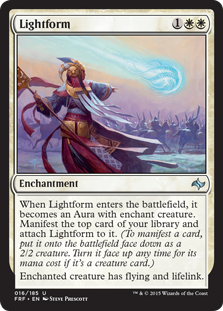
Lightform
Outside of the Manifest ability, let’s look at what we get with Lightform – a 2/2 with flying and lifelink for three mana. That’s pretty efficient mana-wise. The double white makes it harder to include in decks yet if it proves powerful enough then I can definitely see it being played. If we include Manifest in the mix, then it becomes even better even though we don’t quite know the power level of Manifest yet.
This card is potentially Legacy playable as James pointed out in his preliminary review – the interactions Manifest has with Sensei’s Divining Top, Phyrexian Dreadnought, Enlightened Tutor, and other cards is there but I’m not quite sure if it is good enough without further support. It’s definitely not as good as the blue form, which grants hexproof, however flying and lifelink are still pretty strong on something like Phyrexian Dreadnought.
Regardless of the tournament play, casual player wise I think this is going to be a big hit. Foils are probably good targets and even non-foils could rise in price over time.
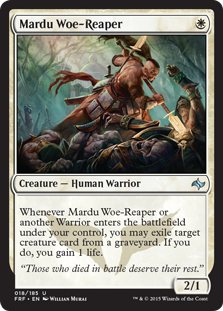
Mardu Woe-Reaper
We’ve certainly come a long way from Savannah Lions. A cross between Elite Vanguard and Scavenging Ooze, if Warriors becomes a deck in Standard you can expect a playset of this guy to be found in it. Keep any copies you get and hold onto them because if Warriors isn’t good now it still has potential down the road. Cheap foil copies of this card will be a nice pickup.
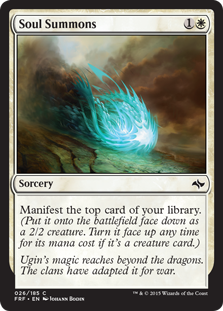
Soul Summons
I’m not sure if this card is any good but it is a cheap Manifest enabler, so if the Manifest emerges and plays any copies of this card then it could be good to stash away some copies for potential future growth.
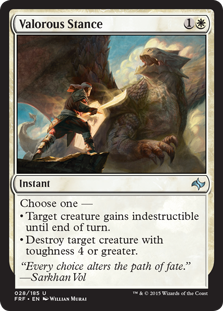
Valorous Stance
This card is going slide very nicely into the currently existing U/W Heroic archetype and is also flexible enough to see play in other decks. I would target foils of this especially.
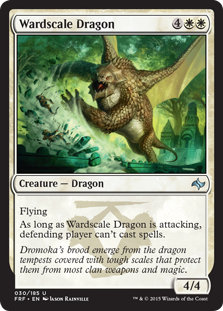
Wardscale Dragon
I wouldn’t bother with nonfoils here. Foils are good pickups for Commander, since eliminating players from casting spells during your combat is nice effect. Casual players will help boost the price of foils as well since many players like to collect foil dragons.
Blue
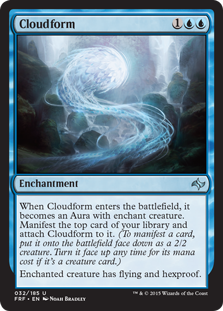
Cloudform
This is definitely an upgrade on its cousin Lightform in white. Flying and hexproof are a powerful combination of abilities and similar to Lightform you are getting at least a 2/2 flyer with hexproof for three mana – efficient enough for Modern and maybe even Legacy play. This card has applications in Standard as well, though I think it will shine the most in eternal formats. Picking up foil copies is a good move for the long term.
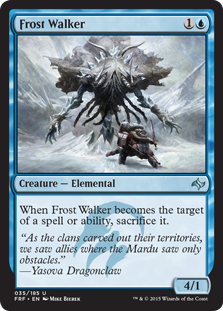
Frost Walker
Though quite fragile, two mana for a 4/1 is a pretty good deal. Just like in limited, in Standard this card is an easy enough Ferocious enabler and could potentially see play there. Definitely don’t pick these up with cash – collect them through limited events and as trade throw-in’s for potential long term gain once Theros block rotates from Standard.
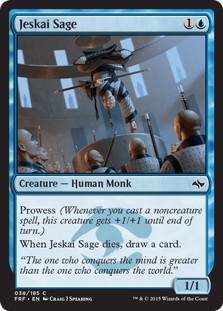
Jeskai Sage
For some reason, this card seems pretty good to me in Standard. If you’re playing a deck based on prowess, for the most part this guy is a 2/2 for two that draws you a card when it dies. I think that’s a pretty good deal but I’m not sure if it is good enough for Standard – at least not this Standard. I’m going to be keeping an eye on Jeskai Sage for potential Standard play.
If not Standard, he is definitely Cube worthy. Cheap foils are worth picking up.
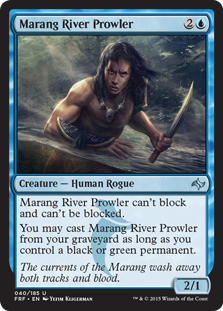
Marang River Prowler
Similar to the Sage above, this guy might be cute for Standard though I think it doesn’t quite gets there. If you target the river prowler do it for the Cube’s sake rather than Standard. Cheap foils could be a good speculation here.
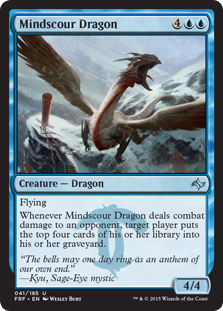
Mindscour Dragon
Stick to foils here due to Dragon collectors and potentially Commander. The effect isn’t that good for this dragon since milling is kind of the opposite of your game plan when you’re beating someone’s face in with flying monsters. My hopes for Commander play could be dashed due to that but hopefully the 60 card casual players still salivate over Mindscour Dragon.
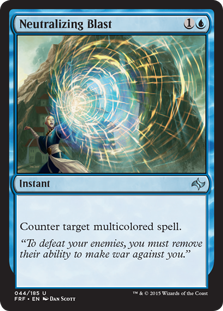
Neutralizing Blast
Seems OK in Standard yet multicolored can be real hit or miss depending on the matchup. I think this card will be relegated to sideboard play but could still retain value if more multi-colored cards start popping up in Standard over the next year.
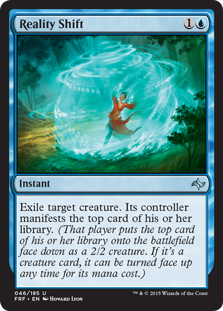
Reality Shift
This card is pretty nice, especially in eternal formats. For two mana it turns an opposing beat stick into a 2/2 creature with no abilities. I’m not sure if it is good enough in Standard however it could wind up seeing play if Manifest turns out be a Tier 2 strategy.
Foils are good targets for Legacy, Modern, or Cube play.
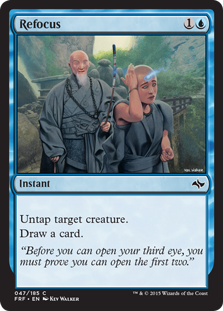
Refocus
This could be an interesting cantrip trick for U/W Heroic or Jeskai Ascendancy shenanigans in Standard. In eternal formats, foils would be a better target than non-foil since Ascendancy in eternal formats relies on untapping creatures as part of the combo and this card can help continue the combo by drawing an additional card.
Black
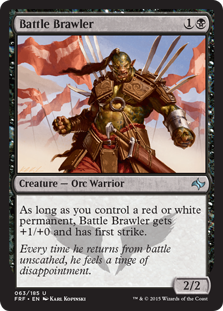
Battle Brawler
Battle Brawler is quite an efficient Warrior – for two mana you get a 2/2 that becomes a 3/2 with first strike if you control a red or white permanent. I could definitely see this getting played in a B/W or other Warriors build in Standard. Pick up copies on the cheap whenever you can in case Warriors becomes a deck and it plays this card.
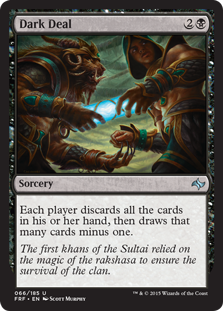
Dark Deal
As James mentioned, Dark Deal is quite the combo enabler. Black hasn’t really ever seen a card like this before so I’m definitely interested in seeing if it makes an impact on eternal formats. Picking up foils seems like the best bet long term as I don’t think it will see much Standard play.
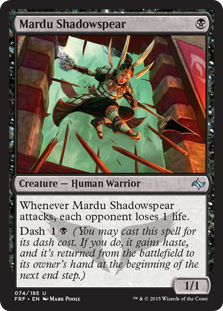
Mardu Shadowspear
Dash is actually what makes this card awesome. Not only can you drop it on turn one if you want to play your deck on curve, during the late game you can Dash it into combat to take away those final points of your opponent’s life total if needed. This card isn’t that good during the mid game, which is a downside, but otherwise I think it is a fine card that has a good shot at being included in either a Warrior or other aggro deck.
Though Shadowspear is also the Game Day promo, which could be a good target if you want the full art version, I think nonfoil copies are also good to hold onto for potential future growth.
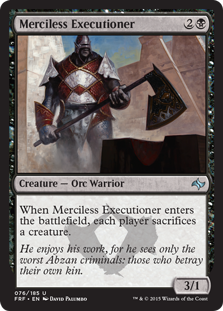
Merciless Executioner
Fleshbag Marauder as a Warrior seems good. You can put it into a tokens deck and use it to your advantage against non-token strategies. It might also might appear in a Warriors deck if it fits along the curve nicely. I’ll be watching this card as time moves along.
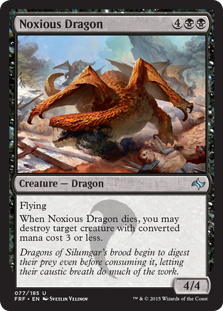
Noxious Dragon
Not amazing though again foils are nice target for the casuals and collectors of Dragons amongst us.
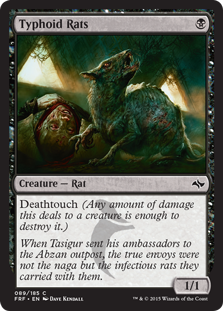
Typhoid Rats
No matter how many printings the Rats get, they always seem be worth at least a few cents on a buylist. Stock up on copies and one day you might find that they will surprise you when you go to collect.
Red
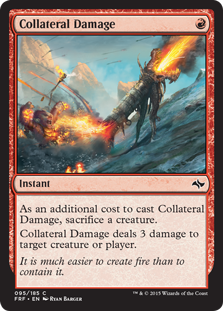
Collateral Damage
The new spin on Lightning Bolt, this card might not be Stoke the Flames but it is still powerful in token based strategies since you can just sack one of your tokens to Bolt something. Keep any copies you get aside to see if they’re worth anything eventually.
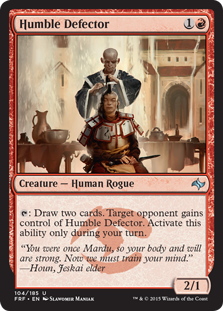
Humble Defector
I’m honestly not sure how this card will shake out. Giving it to your opponent is a huge downside that could turn this card into a Goblin Piker in many cases. Yes, there are magical Christmasland scenarios where you give it to your opponent, steal it back with Yasova, then use it again, yet I think that these scenarios are the exception rather than the rule.
What this card really needs are instant speed sac outlets that allow it happen without any side effects, kind of like Collateral Damage. Hmm, maybe there is something to this…
Though Standard might lack these effects, Modern or other formats where giving it to your opponent might not matter (since you plan on winning that turn) are a different story. I would only target cheap foils of this card for now, and only as pure speculation. The power hasn’t been proven yet, however if it breaks out then it’s price could gain quite substantially.
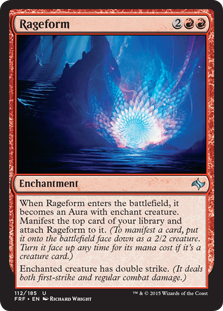
Rageform
While not nearly as efficient as its white and blue counterparts, double strike is a pretty nice bonus that becomes better if you can Manifest a good creature. My hopes might be higher than how actually good it is though. I’ll be keeping an eye on this one moving forward.
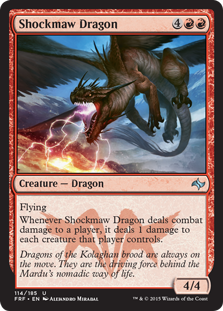
Shockmaw Dragon
Like the other Dragons, the ability is not that great but foils should do well long term.
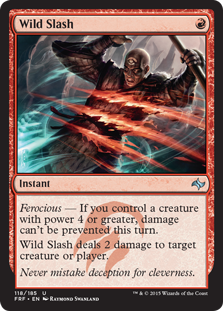
Wild Slash
In addition to a Lightning Bolt variant, this set also gave us a Shock variant that makes the damage unpreventable if you have Ferocious. I can see this being played in Standard, and if not this Standard then definitely post Theros block. Keep some copies stored away for anticipated Standard play and possibly in Modern or beyond.
Due to its ubiquity in being played in almost any red deck and the fact that it is uncommon, I think that Wild Slash could be one of the most financially relevant cards in Fate Reforged.
Green
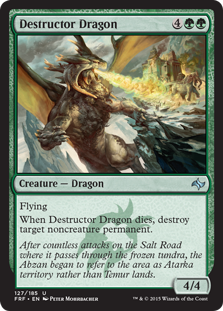
Destructor Dragon
OK, this dragon is definitely the most powerful (casually) of the uncommon cycle. Not only do you get a 4/4 flyer in green for six mana, you also get to take out the strongest noncreature permanent when it dies. This dragon should be targeted above all of its other uncommon brethren because it seems like it will be amazing in Commander.
Foils again will be the best targets.
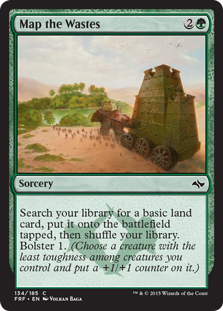
Map the Wastes
I think this could actually have Standard potential. I like being able to turn my Elvish Mystic into a 2/2 while also being able to continue ramping. I might be stretching the playability of the card but it can’t hurt to set some aside in anticipation of potential play.
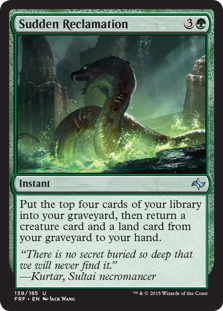
Sudden Reclamation
I like the fact that this card is an instant and will return a creature and a land from your graveyard to hand. Though not as mana efficient as Satyr Wayfinder, it can get you big bombs or help fix your mana by getting back previously self-milled lands. I also think that it will almost always get back both the creature and the land. Couldn’t hurt to pick up some copies on the cheap.
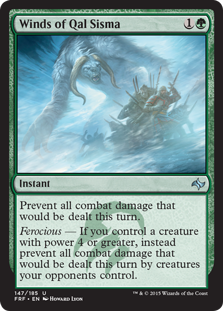
Winds of Qal Sisma
This card is a real blowout if you can setup a scenario where you come out on top. I think R/G midrange decks might utilize it as a neat combat trick to help clear the way. This is not something that will spike overnight or anything, though it could prove useful in Standard at least in sideboards.
Multicolored
The only multicolored uncommons and commons I could see maybe getting Standard play are Harsh Sustenance and War Flare, but I still don’t think they are powerful enough to compete. The multicolored uncommons and commons don’t look that great financially to me.
Artifact
The only uncommon/common artifact that I like from the set is Hero’s Blade. This is a nifty artifact for Commander generals, so I would target both foils and nonfoils on the cheap for potential future demand. No other uncommon and common artifacts look appealing to me from the set.
Lands
The only uncommon/common lands in Fater Reforged are the reprinted Khans Refuges, that is the dual lands that come into play tapped and gain you one life. No lands are financially relevant in Fate Reforged
Summary
Here’s the top five uncommons and commons (by cycle, if applicable) in list format so that you know which uncommons and commons I think will hold the most financial value in Fate Reforged moving forward.
HONORABLE MENTION: Reality Shift
- Wild Slash
- Mardu Woe-Reaper
- Cloudform
- Humble Defector
- Dark Deal
Here is my top five FOIL uncommons and commons (by cycle, if applicable)
- Dragons (especially the Green one)
- Cloudform and Lightform
- Humble Defector
- Dark Deal
- Reality Shift
Again, let me reiterate that I am not recommending that players buy thousands of these uncommons/commons en masse trying to make a profit by expecting them to spike. Uncommons and commons are notoriously slow to increase in price, if at all. It takes something like Delver of Secrets level of play to make that happen – and even then it was a few years before it really started going up in value.
I also hope this article will enable players to identify the more powerful uncommons and commons in the set so that they can pick them up for decks if they want to play them, and that it helps players building cubes to identify which foil uncommons and commons are best to pick up.








